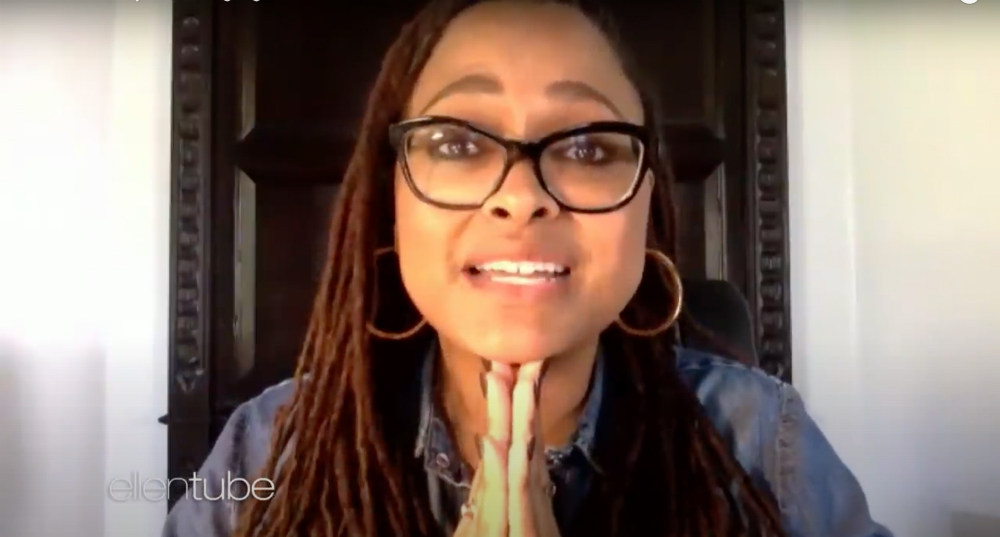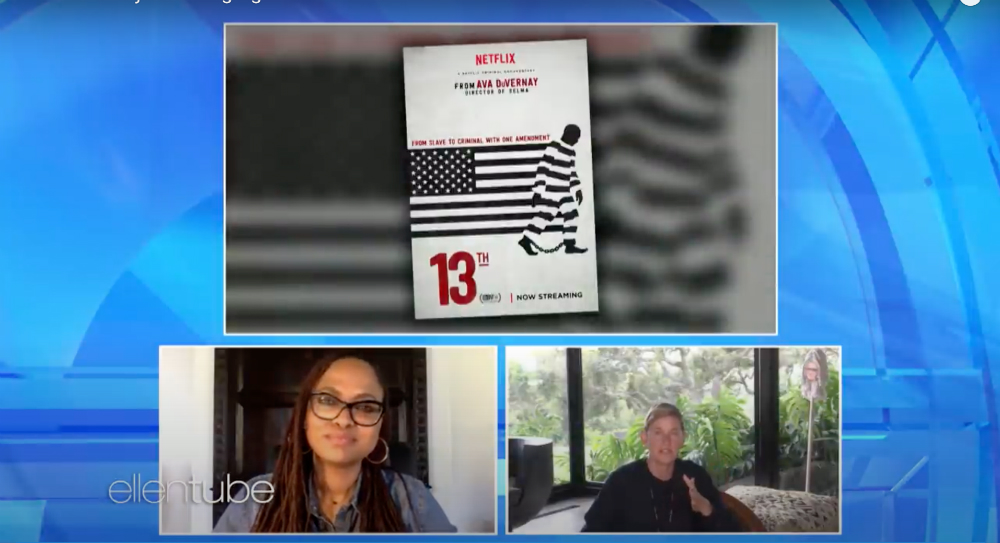Ava DuVernay appeared on Ellen DeGeneres’ virtual talk show on Monday to discuss her documentary 13th being offered for free on Netflix and her reaction to everything going on around the country currently. Ava said she’s been spending much of her time trying to figure out why, after all the time she’s spent with police footage for her work, did the murder of George Floyd strike such a deep cord within her. She realized it was because for once, both victim and murderer were shown, full face, to the camera. As horrifying as it was to see an officer take a life in front of our eyes, at least his face was known and a name put to it, something Ava thinks will go a long way to helping curb police brutality.
Ava, what has been going through your mind, watching everything that’s happening over the last week and a half?
I am unfortunately kind of desensitized to so many of the racist, violent images, because I have to use them so much in my work. I looked through thousands and thousands of hours of this kind of footage for 13th, looked through beatings and police brutality footage for Selma and for When They See Us. So it was really shocking to me why the George Floyd video just brought me to my knees. And I think… it was because we actually watched both parties’ faces perfectly framed. It wasn’t a body cam footage when you saw the black person shot and you did not see the officer. It wasn’t grainy footage from a security camera across the street. It was both men, right in your face, right to the lens, one begging for his life and one taking his life. And I think the startling nature of that, for me, is it showed me, and when you ask what I’ve been thinking about, it made me realize that we have let police officers who abuse off the hook by allowing them to recede into society and kind of disappear. We know the names of the black victims, Philando Castile, Oscar Grant, Sandra Bland, Sean Reed, Tamir Rice, Eric Garner, Mike Brown, it goes on and on. But we never know who killed them, right? This invisibility allows us to tell a story that is incomplete. And so, for me, that’s a lot of what I’ve been thinking about in this moment. How we’ve allowed this sense of police invisibility, which leads to a lack of accountability, which is just one of the many issues within our current criminal justice system that needs to be dismantled.
[From The Ellen Show via YouTube]
I’ve linked Ava’s segments below. As a side note, Ellen is trying to convince us she cares about what inequality has done in this country… while she sits in her multi-million-dollar mansion with a backdrop of one producer forced to hover outside her window and the other’s whose face has been stuck to a mop and propped up by an ottoman. She continues to not get it, any of it. But Ava does and fortunately for us, she is willing to put up with Ellen’s nonsense so she can reach us. Ava’s answer is not only beautifully articulated, it’s a huge part of the conversation. ‘A few bad apples,’ is the absurd – and lazy – excuse to explain issues with the police. If we exposed those bad apples, plastered their name next to their victim’s while discussing their crimes, my guess is the number of ‘bad apples’ would decrease exponentially. Ava, who has always been a woman of action, discussed the new initiative she’s working on called LEAP, which stands for Law Enforcement Accountability Project. LEAP looks to create a “narrative change around police abuse, misconduct and murder of black people,” across all forms of art. She discusses it in the second segment posted below.
13th is available, to watch for free currently. I join in the voices suggesting anyone who has not seen it to watch it as soon as you can. It is, as Ava said in the second segment below, “a brisk 100-minute American history lesson,” but not any history you’ve been taught prior. It frames the systematic racism that was put in place from the inception of this country and became fully institutionalized when it was legalized by a loophole written into the 13th Amendment. I want to believe we will move forward as a country but it’s hard when The Help is number one and people are still sleeping on 13th and Just Mercy, which is also currently free to watch.
Photo credit: WENN/Avalon and YouTube

















I love Ava and good for her for doing the work. Of course “The Help” is number one because it’s some “white savior” BS. What’s next? “Driving Miss Daisy”??? Guarantee if “Green Book” was on there it would be number one too. 🙄
This article brought in as much information as the WAPO article I read on Ava.
This is exactly what needs to happen:
“If we exposed those bad apples, plastered their name next to their victim’s while discussing their crimes, my guess is the number of ‘bad apples’ would decrease exponentially.”
As so many have pointed out over the last few weeks, iIt is systemic, not just a few bad apples.
Police unions have a lot of power. They want officer anonymity because they fear retaliation, and they don’t want to have their personal judgement questioned in what they perceive as dangerous situations. The officers who pushed the elderly man in Buffalo all resigned from the special team that they were on because they wanted everyone to know that they were “following orders”, and it was their fault that they all walked over his injured body to continue to “follow orders.”
I knew a Black man when he was in the LAPD police academy. He told me about one class where they taught him to perceive that EVERY situation is potentially dangerous and fatal. They put up pictures of people’s faces and named the car they drove and asked the recruits if they would feel safe stopping each person. One picture was of a white woman, blond who looked like a soccer mom, and she drove a mom car, like a station wagon. It turned out that of the group of photos, she was a real defendant. When the officer stopped her for a small traffic violation, she threw acid in the officer’s face and killed him. He said that he would never forget that. But many officers still use their own judgement about who and who is not dangerous based on bias, and officers are still conditioned not to question another officer’s judgement.
I totally agree that we should know the names of the officers who took those lives because, even if they were fired from the force they were on at the time of the murder, they usually still retain their state POST (police officer standards and training) certification.
That means they can still get hired elsewhere and continued to harass and injure other POC without the community knowing about it.